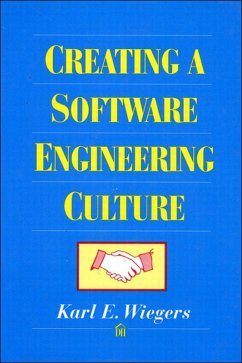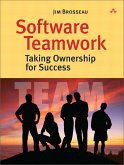This is the digital version of the printed book (Copyright © 1996).
Written in a remarkably clear style, Creating a Software Engineering Culture presents a comprehensive approach to improving the quality and effectiveness of the software development process.
In twenty chapters spread over six parts, Wiegers promotes the tactical changes required to support process improvement and high-quality software development. Throughout the text, Wiegers identifies scores of culture builders and culture killers, and he offers a wealth of references to resources for the software engineer, including seminars, conferences, publications, videos, and on-line information.
With case studies on process improvement and software metrics programs and an entire part on action planning (called "What to Do on Monday"), this practical book guides the reader in applying the concepts to real life.
Topics include software culture concepts, team behaviors, the five dimensions of a software project, recognizing achievements, optimizing customer involvement, the project champion model, tools for sharing the vision, requirements traceability matrices, the capability maturity model, action planning, testing, inspections, metrics-based project estimation, the cost of quality, and much more!
Principles from Part 1
- Never let your boss or your customer talk you into doing a bad job.
- People need to feel the work they do is appreciated.
- Ongoing education is every team member's responsibility.
- Customer involvement is the most critical factor in software quality.
- Your greatest challenge is sharing the vision of the final product with the customer.
- Continual improvement of your software development process is both possible and essential.
- Written software development procedures can help build a shared culture of best practices.
- Quality is the top priority; long-term productivity is a natural consequence of high quality.
- Strive to have a peer, rather than a customer, find a defect.
- A key to software quality is to iterate many times on all development steps except coding: Do this once.
- Managing bug reports and change requests is essential to controlling quality and maintenance.
- If you measure what you do, you can learn to do it better.
- You can't change everything at once. Identify those changes that will yield the greatest benefits, and begin to implement them next Monday.
- Do what makes sense; don't resort to dogma.
Dieser Download kann aus rechtlichen Gründen nur mit Rechnungsadresse in A, B, BG, CY, CZ, D, DK, EW, E, FIN, F, GR, HR, H, IRL, I, LT, L, LR, M, NL, PL, P, R, S, SLO, SK ausgeliefert werden.
Es gelten unsere Allgemeinen Geschäftsbedingungen: www.buecher.de/agb
Impressum
www.buecher.de ist ein Shop der
buecher.de GmbH & Co. KG
Bürgermeister-Wegele-Str. 12,
86167 Augsburg
Amtsgericht Augsburg HRA 13309
Persönlich haftender Gesellschafter: buecher.de Verwaltungs GmbH
Amtsgericht Augsburg HRB 16890
Vertretungsberechtigte:
Günter Hilger, Geschäftsführer
Christian Sailer, Geschäftsführer
Sitz der Gesellschaft:Augsburg
Ust-IdNr. DE 204210010









